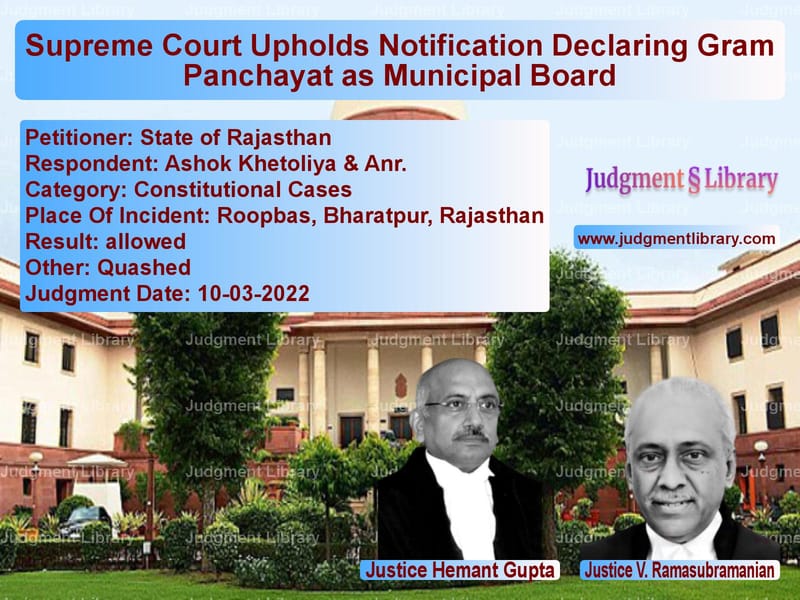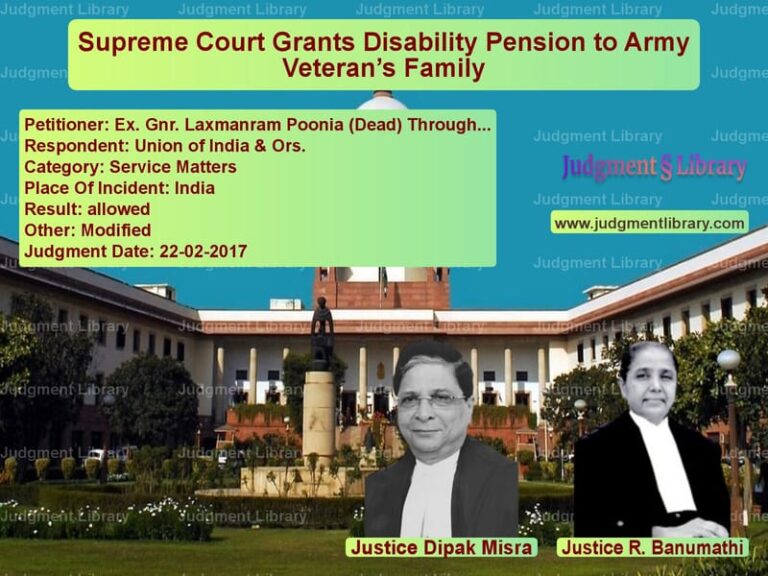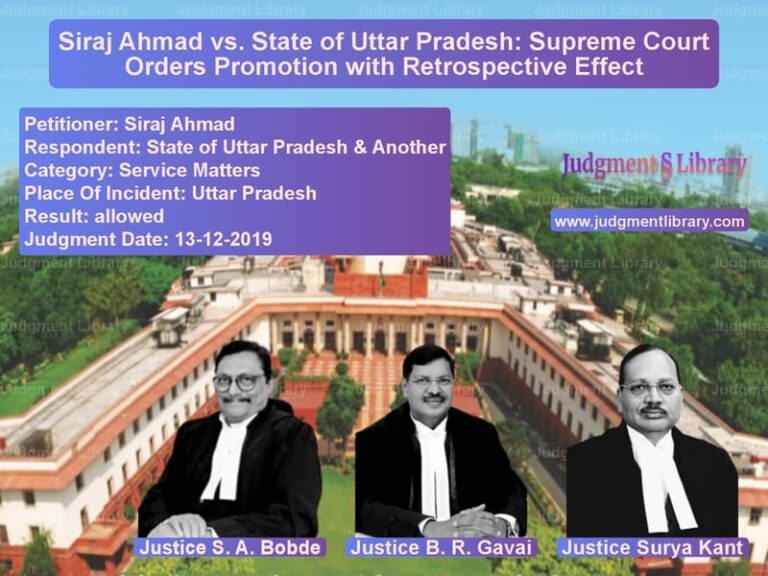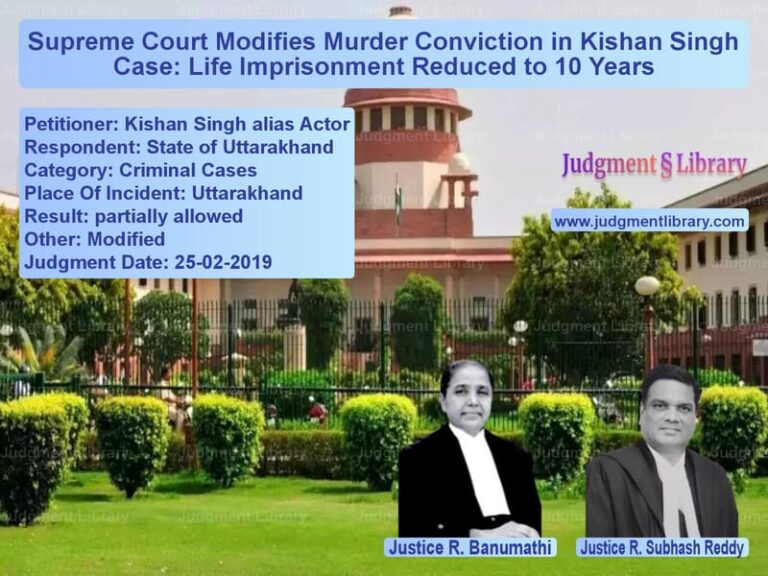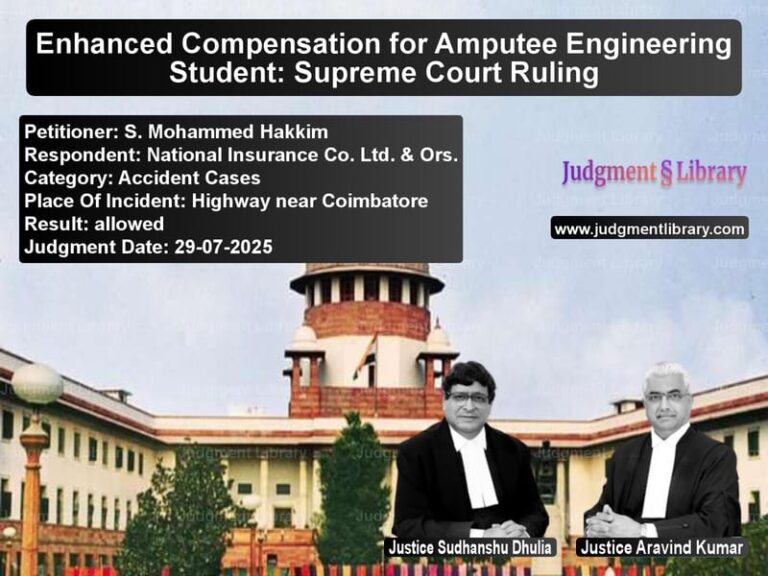Supreme Court Upholds Notification Declaring Gram Panchayat as Municipal Board
The case of State of Rajasthan vs. Ashok Khetoliya & Anr. is a significant ruling regarding the establishment of municipal boards under the Rajasthan Municipalities Act, 2009. The Supreme Court ruled that the Rajasthan High Court erred in striking down a notification declaring Gram Panchayat Roopbas as a municipal board.
This appeal was filed by the State of Rajasthan, challenging the Rajasthan High Court’s decision that set aside the notification declaring Gram Panchayat Roopbas, District Bharatpur as a municipal board. The Supreme Court upheld the government’s authority to issue such notifications.
Background of the Case
The dispute arose when the Rajasthan government, exercising its powers under the Rajasthan Municipalities Act, 2009, issued a notification on August 12, 2014, declaring Gram Panchayat Roopbas as a municipal board. The respondents challenged this decision before the High Court.
The Rajasthan High Court struck down the notification, holding that the government had failed to issue a public notification under Article 243Q(2) of the Constitution, specifying Roopbas as a “transitional area.” The State of Rajasthan then appealed to the Supreme Court.
Key Legal Issues
- Whether the notification under the Rajasthan Municipalities Act, 2009, was valid without a separate notification under Article 243Q(2) of the Constitution.
- Whether the High Court exceeded its jurisdiction by interfering in a legislative function.
- Whether the declaration of a municipal board is a legislative function of the state government.
Arguments by the Petitioner (State of Rajasthan)
The State of Rajasthan contended:
- The Rajasthan Municipalities Act, 2009, provides the framework for declaring a Gram Panchayat as a municipal board.
- The notification was issued in compliance with Section 5 of the Act, which does not require a separate notification under Article 243Q(2).
- The High Court misinterpreted the Constitution by assuming that a two-step process (separate notifications under Article 243Q and the Municipalities Act) was required.
- Declaring a municipal board is a legislative function, and courts cannot interfere with such policy decisions.
Arguments by the Respondents (Ashok Khetoliya & Anr.)
The respondents argued:
- The notification lacked a prior declaration of Roopbas as a “transitional area” under Article 243Q(2), making it unconstitutional.
- The government cannot arbitrarily convert a Gram Panchayat into a municipal board without following due process.
- The Rajasthan High Court correctly applied constitutional principles to prevent the arbitrary exercise of executive power.
Supreme Court’s Observations
The Supreme Court analyzed the legislative and constitutional framework governing local bodies. The Court made the following key observations:
- The Rajasthan Municipalities Act, 2009, was enacted to bring state laws in line with Part IXA of the Constitution, which governs urban local bodies.
- Article 243Q(2) does not require a separate notification before the state can exercise its powers under the Municipalities Act.
- The decision to declare an area as a municipal board is a legislative function that cannot be questioned by courts unless it is unconstitutional.
- The High Court’s reliance on previous case law was misplaced, as those cases dealt with different statutory frameworks.
Based on these findings, the Supreme Court ruled:
- The appeal was allowed.
- The High Court’s decision was set aside.
- The notification declaring Gram Panchayat Roopbas as a municipal board was valid.
Legal Precedents Considered
The Supreme Court referred to multiple judgments on the legislative competence of state governments:
- Tulsipur Sugar Co. Ltd. vs. The Notified Area Committee, Tulsipur (1980): Held that declaring an area as a municipal board is a legislative function.
- Sundarjas Kanyalal Bhatija vs. Collector, Thane (1989): Affirmed that policy decisions regarding local governance are within the purview of the state legislature.
- State of U.P. vs. Pradhan Sangh Kshettra Samiti (1995): Recognized the state’s authority to define and establish local governance structures.
Impact of the Judgment
This ruling has significant implications for local governance:
- It reinforces the power of state governments to designate municipal areas without requiring separate constitutional notifications.
- It ensures that legislative decisions regarding local governance are not subject to excessive judicial interference.
- It clarifies that High Courts must not impose additional procedural requirements beyond what the law mandates.
- It upholds the constitutional framework that enables state legislatures to create municipal boards and councils as needed.
By ruling in favor of the State of Rajasthan, the Supreme Court reaffirmed that state governments have broad powers in shaping local governance structures, provided they comply with the statutory framework.
Petitioner Name: State of Rajasthan.Respondent Name: Ashok Khetoliya & Anr..Judgment By: Justice Hemant Gupta, Justice V. Ramasubramanian.Place Of Incident: Roopbas, Bharatpur, Rajasthan.Judgment Date: 10-03-2022.
Don’t miss out on the full details! Download the complete judgment in PDF format below and gain valuable insights instantly!
Download Judgment: state-of-rajasthan-vs-ashok-khetoliya-&-an-supreme-court-of-india-judgment-dated-10-03-2022.pdf
Directly Download Judgment: Directly download this Judgment
See all petitions in Legislative Powers
See all petitions in Public Interest Litigation
See all petitions in Judgment by Hemant Gupta
See all petitions in Judgment by V. Ramasubramanian
See all petitions in allowed
See all petitions in Quashed
See all petitions in supreme court of India judgments March 2022
See all petitions in 2022 judgments
See all posts in Constitutional Cases Category
See all allowed petitions in Constitutional Cases Category
See all Dismissed petitions in Constitutional Cases Category
See all partially allowed petitions in Constitutional Cases Category

